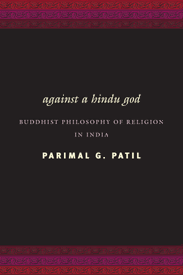Against a Hindu God
Patil, Parimal G.:
Against a Hindu god : Buddhist philosophy of religion in India / Parimal G. Patil. - New York : Columbia University Press, 2009. - 393 S. : Ill.
ISBN 978-0-231-14222-9
US$ 50,00
DDC: 294.34
-- Angekündigt für Juni 2009 --
Beschreibung
Arguments about the existence of God are not confined to the West. Buddhist and Hindu philosophers in premodern India engaged in centuries-long arguments about the existence of a God-like being called "Īśvara" and the religious epistemology used to support them. These arguments culminated in a sophisticated critique by the eleventh-century Buddhist intellectual Ratnakīrti, one of the last great Buddhist philosophers of India. By focusing on Ratnakīrti's arguments against his Hindu opponents, Parimal G. Patil summarizes South Asian intellectual practices and shows how the philosophy and intellectual history of religions was understood in precolonial South Asia.
Based at the famous university of Vikramaśīla, Ratnakīrti brings the full range of Buddhist philosophical resources to bare on his critique of the Hindu "design-inference," the most important argument for the existence of Īśvara in Medieval and early-modern India. At stake was nothing less than the nature of rationality, the metaphysics of epistemology, and the relevance of philosophy to the practice of religion. The first book to document Buddhist philosophy of religion in the final phase of Buddhism in India, Against a Hindu God transcends the disciplinary boundaries of religious studies, philosophy, and South Asian studies. Through a comparative approach to the philosophy of religions, it brings the remarkable work of philosophers like Ratnakīrti to bear on contemporary conversations in religion and philosophy. [Verlagsinformation]
Besprechung von Stephen Phillips, in: H-Buddhism, H-Net Reviews. January, 2010. URL: http://www.h-net.org/reviews/showrev.php?id=25550.
Inhalt
Abbreviations
INTRODUCTION
Chapter 1. Comparative Philosophy of Religions
1. Disciplinary Challenges
2. A Grammar for Comparison
3. Comparative Philosophy of Religions
4. Content, Structure, and Arguments
PART 1. EPISTEMOLOGY
Chapter 2. Religious Epistemology in Classical India: In Defense of a Hindu God
1. Interpreting Nyāya Epistemology
2. The Nyāya Argument for the Existence of Isvara
3. Defending the Nyāya Argument
4. Conclusion: Shifting the Burden of Proof
Chapter 3. Against Īśvara: Ratnakīrti’s Buddhist Critique
1. The Section on Pervasion: The Trouble with Natural Relations
2. Two Arguments
3. The Section on the Reason Property
4. The Section on the Target Property
5. Conclusion: Is Isvara the Maker of the World?
PART 2. LANGUAGE, MIND, AND ONTOLOGY
Chapter 4. The Theory of Exclusion, Conceptual Content, and Buddhist Epistemology
1. The Theory of Exclusion
2. What Exclusion Is Not
3. Semantic Value
4. Ratnakīrti’s Inferential Argument
5. Conclusion: Jñānaśrīmitra’s Three Questions
Chapter 5. Ratnakīrti’s World: Toward a Buddhist Philosophy of Everything
1. An Inventory of Mental Objects/Images
2. The Contents of Perception
3. The Contents of Inferential/Verbal Awareness
4. Nonexistence, Existence, and Ultimate Existence
5. The Īśvara-Inference, Revisited
6. Conclusion: Who Created the World?
Conclusion
Chapter 6. The Values of Buddhist Epistemology
1. Foundational Figures and Foundational Texts
2. The Soteriological Significance of Epistemology
3. Jñānaśrīmitra on Epistemology as Pedagogy
4. Ratnakīrti’s Framework of Value
5. Conclusion: Religious Reasoning as Religious Practice
References
Index
Autor
PARIMAL G. PATIL is John L. Loeb Associate Professor of the Humanities at Harvard University. Faculty profile.
Quellen: Columbia University Press; Amazon; WorldCat
Ähnlich
- Franco/Notake: Dharmakīrti on the Duality of the Object
- Moriyama: Omniscience and Religious Authority
- Sthiramati's Pañcaskandhakavibhāṣā
- Park: Vasubandhu, Śrīlāta, and the Sautrāntika Theory of Seeds
- Eltschinger: Buddhist Epistemology as Apologetics
- Schmithausen: The Genesis of Yogācāra-Vijñānavāda
- Steinkellner: The Edition of Śāntarakṣita's Vādanyāyaṭīkā
- Kuijp/McKeown: bCom ldan ral gri
- Carpenter: Indian Buddhist Philosophy
- Colsman: Bewusstsein, konzentrative Meditation und ganzheitsorientiertes Menschenbild

